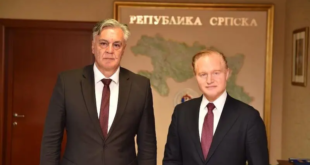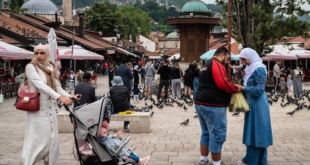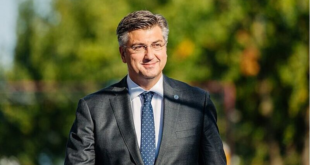Reforms in Bosnia remain stalled due to internal divisions, with Bosnian Serbs growing increasingly defiant of the international community and undermining the peace agreement which ended the country’s 1992-95 war, Bosnia’s top international envoy told the United Nations Security Council on Monday.
“While regional prospects for reconciliation have improved, the language and logic of politics inside Bosnia-Herzegovina appears to have rather deteriorated,” High Representative to Bosnia Valentin Inzko told the UNSC.
Bosnia remains afflicted “by a lack of basic, and fundamental, consensus about what sort of country it should be, or could be,” he said, adding that as a result it could not take advantage of certain international financial assistance at a time when it is facing growing economic hardship.
Inzko was particularly critical of the leaders of Bosnia’s Serb dominated part Republika Srpska, accusing them of challenging his authority and disputing the country’s sovereignty and constitutional order.
He said that the Republika Srpska had led the way in undermining Bosnia’s central institutions by threatening to hold a referendum to repudiate his authority. It was also increasingly challenging the Dayton peace agreement, including by statements about possible “emergence of a new state” and proposals to discuss Bosnia’s “peaceful dissolution”.
However, Inzko also warned that the country’s other part – the Croat-Bosniak (Bosnian Muslim) federation – had “limped from crisis to crisis”, failing to complete governmental and judiciary appointments, as well as to make budget cuts required under a three-year standby agreement with the International Monetary Fund worth €1.2 billion.
The chairman of Bosnia’s tripartite presidency, Haris Silajdzic, also addressed the special session of the UNSC, which was dedicated solely to the situation in the country.
He said that the central parts of the Dayton peace agreement had not been implemented 15 years since the end of Bosnia’s war, including the provisions guaranteeing the rights of all refugees and internally displaced people to freely return to their homes.
Silajdzic was also critical of the voting mechanism in the country’s central institutions, which he said allows only ten Serb deputies to block any decisions by the central parliament, made up of 42 MPs in total.
As a result, Bosnian Serb deputies have blocked more than 260 laws over the past 13 years, allowing passage of less than 150, he said.
The extent of Bosnia’s internal division was particularly apparent in the lead-up to the UNSC session on Monday, with Bosnian Serbs challenging Inzko’s right to report on the situation in the country and describing Silajdzic’s address to the top international body as “unofficial”.
Bosnian Prime Minister Nikola Spiric, an ethnic Serb, has written to the UN Secretary General Ban Ki-moon accusing Inzko of destabilising the country.
“Continuing foreign intervention in local political issues is destabilising and undermines the creation of a consensus… as well as reform efforts,” Spiric wrote in the letter calling for the closure of the Office of the High Representative, OHR.
Spiric told journalists that he had been obstructed by Bosnia’s diplomatic mission at the UN, which he said was “controlled by a Bosniak lobby”, in his desire to adress the Security Council.
Bosnian Presidency Serb member Nebojsa Radmanovic had reportedly also sent a letter to the UN informing them that Silajdzic was in New York “as a private individual” because he had failed to secure the backing of all three presidency members for his address to the UNSC.
Under the Dayton peace agreement, Bosnia was divided into two highly autonomous entities – the Serb-dominated Republika Srpska and Croat-Bosniak federation. Each part has its own government, parliament and presidency, but the two are linked by weak central institutions.
The international community has for long insisted that more powers be transferred to central institutions in order to make the country more functional, but Bosnian Serbs strongly reject that and insist on retaining their autonomy.
The post of the High Representative was also created under the Dayton peace agreement and given the authority to fire local officials and impose laws when leaders cannot agree.
However, Bosnian Serbs have recently stepped up their opposition to the OHR’s continued presence in Bosnia, threatening to call a referendum to let the people of the Republika Srpska voice their opinion on his right to impose decisions.
 Eurasia Press & News
Eurasia Press & News



